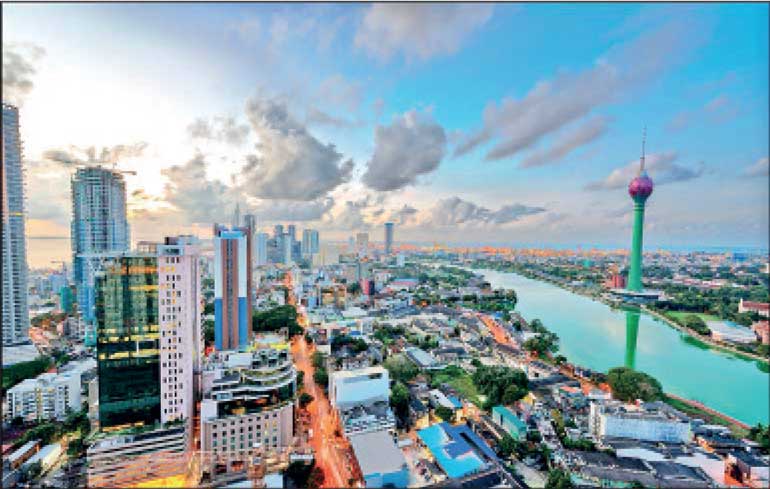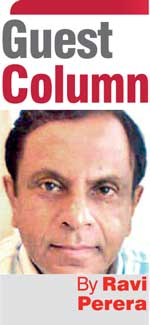Sunday Feb 15, 2026
Sunday Feb 15, 2026
Saturday, 14 December 2024 00:06 - - {{hitsCtrl.values.hits}}

The country, once hopeful, stagnates; never achieving a growth rate that promises a break through
 “The world is what it is, men who are nothing, who allow themselves to be nothing, have no place in it” – V.S. Naipaul
“The world is what it is, men who are nothing, who allow themselves to be nothing, have no place in it” – V.S. Naipaul
I have a distant memory of reading a light-hearted description of heaven and hell, in common belief an inevitable destination for all earthlings; those who lead unsullied lives are directed to the former; botch your book, the man is hightailed to hell.
These two places are obviously ‘constructs’ of the human imagination, by human standards and outlook, the ecstasies promised and the tortures threatened are not only of human concept but are also distinctly period defined (are there personal computers in either place?). There cannot be two more dissimilar destinations in the after-life, heaven is a joyous place of endless pleasures and creature comforts, while hell is all agony, suffering and torture.
In this piece I read, the definition of heaven and hell was determined by racial differences, stereotyping the occupants in the two places.
If I recall correctly, in heaven the administrators were British, the engineers were German, the chefs were French, the Italians were the lovers, Jews were theoreticians and the Africans were the athletes.
In hell, the British were chefs, Germans were policemen, the French were the bureaucrats, the Chinese were the judges, Indians were Cricket umpires and the Africans were the policy makers.
The force of observation
We all know that this kind of typecasting misses the varied range of attitudes and skills any group of people could possess. However, perception has evolved carrying the force of observation running to many years; accordingly, the French make good food, the British have ruled over many lands with remarkable acceptance for an occupier, German engineering skills are legendry, setting the standard in whatever they manufacture. It is also relevant to note that wherever the British settled, whether it be New Zealand, Canada or the United States, are prosperous countries with huge economies today.
They have so much extra economic capacity needing more labour to realise, the one resource they don’t have. To train the imported labour, the best educational institutes in the world are also with them. And, there is an endless line of immigrants from less successful countries waiting to enter, with the hope of enjoying the living standards these countries offer, living standards, that their own countries have been unable to achieve.
I read this description of heaven and hell in my thirties or perhaps even twenties. Although we were not considered for heavenly duties therein, I wondered then what aptitudes of the Sri Lankans could contribute towards the making of heaven, or is there something in our disposition which makes it more likely a contribution towards hell?
At that stage of my life I had little inclination towards such speculative questions, besides, I was at the time not sufficiently alert to the palpable cultural, attitudinal and even biological differences between various races. I assumed that all races could perform more or less in like manner if the right prompts were present; soon, the story went out of mind.
Embarrassing saga of a country full of sound and fury, but going nowhere
Now, a good three decades later, it resurfaced in my mind, perhaps prompted by the endless comings and the goings of so many leaders and political parties in Sri Lanka since; the embarrassing saga of a country full of sound and fury, but going nowhere. Why we missed the bus is played down in our popular narration; a deficiency in the understanding leading to a trivialising of the achievements of successful nations; the matter is reduced to a question of pressing one or two buttons, correct this or that, and we too will get there.
As to which button to press, everybody has an opinion, no surprise there are so many learned men and learned conferences in Colombo pronouncing the answer!
Seventy years later, the loud proclamations of 1948 now sounds facile, the post-independence leaders, captivated by the processes as well as the powers inherent in the “European” model of the “State”, promised to create a model country in Asia. The left oriented main Opposition, not to be outdone, threatened a worker’s paradise should they gain power. Once self-government was obtained, in a few short years we too will be a developed country they assured a dumbfounded voter. Not only did we underestimate the foresight, hard work, skills and the discipline that development of a nation entails, we also adopted a narration that downplays the necessary prerequisites; imagining that by a simple mimic, one could become the original.
Thus, all we needed was to create duplicates; a parliament house, a court system, an administration, political parties, a constabulary and other institutions we had observed in the developed nations, particularly in the United Kingdom. For formal occasions our leaders will don the business suits, even travel the world sharing their “wisdom” at international forums. As to the dress, within the mimic there was another more calculated mimic; leaders westernised in all but name, adopted the more native looking kurta type top and sarong, in expensive silky white, a dress they held out to be home-grown. This dress soon came to be referred to as the “kapati” (cunning) dress, a telling connotation, more in harmony with the wearer’s countenance.
Popular narration is muddled
Clearly, the parody has not borne results. The popular narration is muddled.
After every election, the winners are glorified, their virtues are proclaimed to the world.
Conversely, the losers are vilified, it is shown that their minds were empty. There was so much corruption in the defeated, how could the country have progressed!
To appreciate the fickleness of it all one has to only follow the Government owned newspapers (Lake House), the editorial the day before the election and the day after. It needs a special kind of evolution to create that kind of editorial pliability.
Not only editorials, even history is rewritten, the winners become heroes or victims while the defeated are villains and assailants. What is the truth, what was said before or what is being said now? This malleability in the reportage of what is only recent history, points to an alarming lack of integrity in the intellectual process. This is subjective history, based on a single source or a partisan opinion; history that can be rearranged, to suit those in power. An outsider dealing with this country must take into account the fluidity of our word!
Every new Government proclaims how brain heavy their new team is, so many graduates, even PhDs!
A PhD obtained three decades ago may mean just that, particularly if the recipient had since left academia for the lure of the business world, becoming a promoter or a glorified salesman of goods, instruments and equipment. But in the public narration, his PhD of many years, makes him a permanent source of unerring wisdom.
Again and again, it has been shown that a qualification, particularly a sharply concentrated research like a PhD, does not make that person a miracle maker. There are many other things we have observed in men who have delivered on a national scale; energy, integrity, unyielding principles, capacity to operate with counterparts, leadership, this list can be long, an academic qualification is only one aspect. No great leader: Lenin, Gandhi, Nehru, Mao, Churchill or Mandela were PhDs, however, quite a few PhDs have been sent to the cooler for fraud. The idea of a book qualification automatically making the holder an initiator and a leader in that area, is a non-sequitur.
The country, once hopeful, stagnates
Meanwhile, the country, once hopeful, stagnates; never achieving a growth rate that promises a break through. Laws are adopted only to be soon amended to the point of incomprehension, institutions are launched merely to drain the coffers, roads built are pot-holed with the first rain, every initiative looks doubtful and crude, our ‘public service’ ought to be renamed ‘public torment’!
In every field of economic activity, whether it is productivity per person or our yield per acre is below the world average, while, things manufactured here struggle to compete in markets outside of our shores.
Heaven or hell?
Clearly, we are not good enough to make a meaningful contribution in heaven, that needs global scale skills and competiveness. Nor, so bad that our efforts only result in the hellish; being of such insignificant weightage, the sample size does not bear comparison.
A country stuck in the average range, unremarkable, unless we consider our inclination to ignore the dun of the creditors, while looking for still more international credit!
Perhaps the popular narration, ‘the land of the brainy, capable and the heroic’, is a necessary unction to sooth a tattered national ego. A lilting narration is always preferable to a disagreeable truth.
Contributing towards a heaven or making a hell, will we have to await another 70 years for the answer?